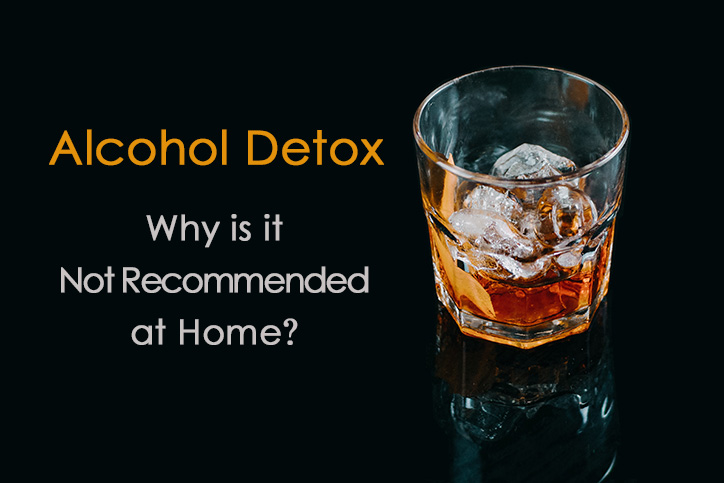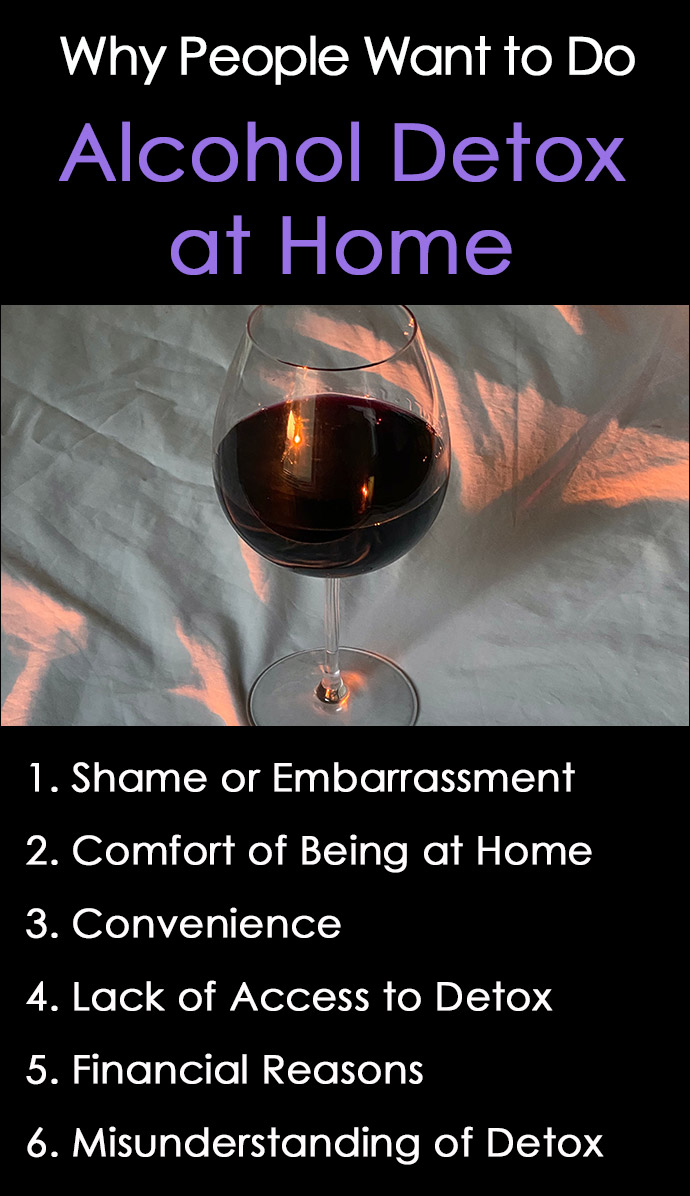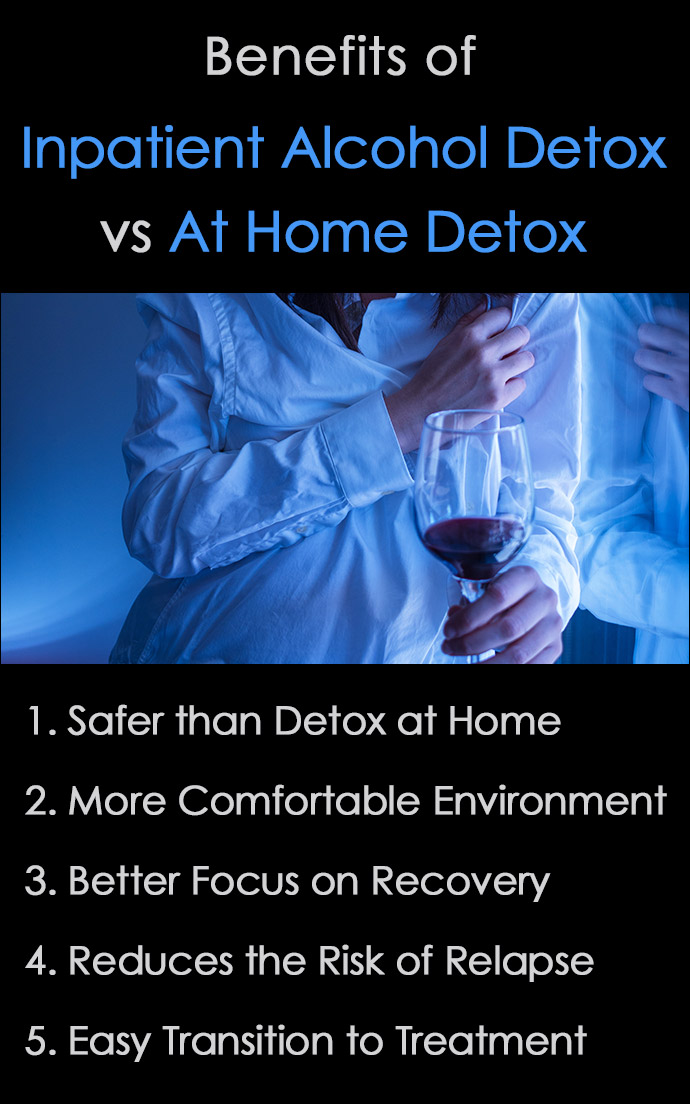Table of Contents
Many people think they can handle alcohol withdrawal at home on their own. While it might be possible for some individuals, unsupervised alcohol detox at home can be dangerous or even fatal for others.
It’s important to understand the very serious set of symptoms that can occur during alcohol withdrawal.
Knowing the risks of alcohol detox at home instead of professional treatment can help people make informed decisions about the safest and most effective approaches to recovering from an addiction to alcohol.
Why do People Want to do Alcohol Detox at Home?
There are a number of reasons why some people would prefer to do alcohol detox at home rather than in a medically monitored setting.
While many of the reasons are valid, it’s necessary to have a proper understanding of the detox process before making a final decision.
Reasons People Want to do Alcohol Detox at Home
1. Shame or Embarrassment
It’s common for people who have a substance addiction to feel a sense of shame, guilt, or embarrassment associated with struggling to get sober.
When trying to overcome an addiction, it’s necessary to put those feelings aside and focus on recovery.
2. Comfort of Being at Home
Everyone feels more comfortable being at home in a familiar setting rather than going to a treatment facility.
Even though a person may feel safe and secure at home, a medically supervised detox treatment center will be a much safer place to overcome dangerous and uncomfortable withdrawal symptoms.
3. Convenience
Staying at home is much more convenient than going away for a week or more.
While staying home is definitely more convenient, detox will only take approximately a week for most people to complete and it’s worth the time and effort to ensure it is done in a safe and appropriate manner.
4. Lack of Access to Detox
Some people live in rural parts of the country or away from cities and don’t have access to detox treatment in their area. Lack of local access can be a problem for quite a few individuals.
Still, most people live within driving distance to a city large enough that has a detox facility. He or she will only need to consider getting to and from treatment one time.
As soon as a person begins detox, they will not be leaving the facility until they have safely finished the entire process.
5. Financial Reasons
Many people have financial concerns, such as a lack of health insurance coverage or the money to pay for treatment. They believe that alcohol detox at home will be cheaper than in a medically monitored facility.
Detox isn’t free and there are costs involved that can seem expensive, but most types of insurance will cover the cost. If a person doesn’t have insurance, many facilities have payment options or access to loan programs. Some even offer scholarship programs.
6. Misunderstanding of Detox
People who don’t understand alcohol withdrawal symptoms won’t realize the complications that can be caused by attempting alcohol detox at home.
There can be serious health risks associated with many types of withdrawal, and some can be worse than others depending on the substance, as well as the frequency and duration of use.
Benzodiazepines and alcohol are two of the most dangerous substances to quit using without proper detox.
It’s important to understand that attempting alcohol detox at home can be unhealthy and even dangerous.
If complications arise, they might cause serious health issues that could end up being even more expensive in the long run.
Dangers of Withdrawal Symptoms During Alcohol Detox at Home
Alcohol withdrawal symptoms occur when a person who is physically dependent to alcohol stops drinking, and they can range from slightly uncomfortable to fatal.
The health complications are much more severe when a person has battled a long-term alcohol addiction.
Physical, mental, and psychological withdrawal symptoms typically start within 12 to 24 hours, or sometimes even a few days after a person’s last drink.
Primary symptoms will peak within 48 to 72 hours, but other symptoms, such as mental health issues, can linger for weeks.
Minor Symptoms of Alcohol Withdrawal May Include:
- Depression, anxiety, and issues regulating mood swings
- Nervousness or irritability
- Headaches
- Nausea and vomiting
- Loss of appetite
- Clammy skin, dry mouth, and sweats
- General sense of exhaustion or fatigue
- Difficulty sleeping, insomnia, or nightmares during sleep
More Severe Alcohol Withdrawal Symptoms Include:
- Serious agitation
- Uncontrollable tremors
- Fever
- Hallucinations
- Delirium
- Seizures
- Death
Alcohol is one of the most dangerous substances to quit because of the possible withdrawal complications, especially for those with a prolonged or excessive drinking problem.
Except for benzos, alcohol detox is much more dangerous than withdrawal from all other substances including cocaine, methamphetamine, opioids, and even heroin.
Actor Nelsan Ellis, a fan favorite on HBO’s hit series “True Blood,” tragically died in 2017 while attempting alcohol detox at home. According to his family, the successful actor struggled with substance abuse for years, and was ashamed of his addiction.
Delirium Tremens Can Be Fatal
Often referred to as “The DTs,” delirium tremens is an incredibly severe form of alcohol withdrawal that can be fatal.
People with a long history of excessive alcohol abuse are at the greatest risk of delirium tremens, as well as those suffering from other chronic illnesses alongside alcohol use disorder.
The Symptoms of Delirium Tremens Include Some of the Following:
- Incoherent thoughts and speech or delusion
- Confusion and agitation
- Shaking and tremors
- Elevated heart rate
- Increased body temperature
- Seizures
- Death
Delirium tremens can last up to five days, and a person may experience some other alcohol withdrawal symptoms before developing the condition.
Benefits of Inpatient vs. Alcohol Detox at Home
There are many reasons to consider an inpatient detox program instead of trying to manage alcohol detox at home.
In addition to being treated by professionals, there are other benefits that many individuals who attempt to detox alone at home fail to recognize.
Benefits of Inpatient Alcohol Detox
1. Inpatient Treatment is Safer than Alcohol Detox at Home
An inpatient alcohol detox program has a medically trained staff of addiction specialists to safely monitor a patient’s symptoms and wellbeing during detoxification.
The detox team understands withdrawal symptoms and the best way to manage them if complications arise.
2. More Comfortable Environment
A detox facility will keep the patient comfortable at all times to ensure they get adequate rest and a healthy diet necessary for recovery. If necessary, medications can be used to ease uncomfortable withdrawal symptoms.
Inpatient detox often offers luxury amenities and 24/7 care around the clock to take care of all patient needs.
3. Better Focus on Recovery
The entire focus will be on detox and away from any daily stressors or distractions that may compromise or hinder recovery when attempting alcohol detox at home.
The patient will not have to take care of other regular responsibilities at home while healing.
4. Reduces the Risk of Relapse
Undergoing detox in a treatment facility offers a safe, alcohol-free environment that reduces the risk of a relapse and keeps the patient on-track until the process has been completed.
When alcohol detox at home becomes difficult, some people revert to drinking to ease the discomfort and relapse back where they started. An inpatient program greatly decreases the chances of a relapse during detox.
5. Easy Transition to Treatment After Detox
After detox has been completed, many individuals continue to a 30-day alcohol treatment program to ensure they remain sober by learning ways to overcome addiction triggers and cravings.
It is a very easy transition from inpatient detox to a 30-day addiction treatment program because the patient is already at the facility and has been working with the treatment team during the course of detox. This offers the greatest chance of a successful recovery.
Besides the risks of alcohol detox at home and the chance of relapsing when withdrawal symptoms become difficult, an inpatient program is clearly the safest and most effective way to detox from alcohol.
At the very least, it is definitely worth speaking with a treatment facility first before attempting to detox at home.





